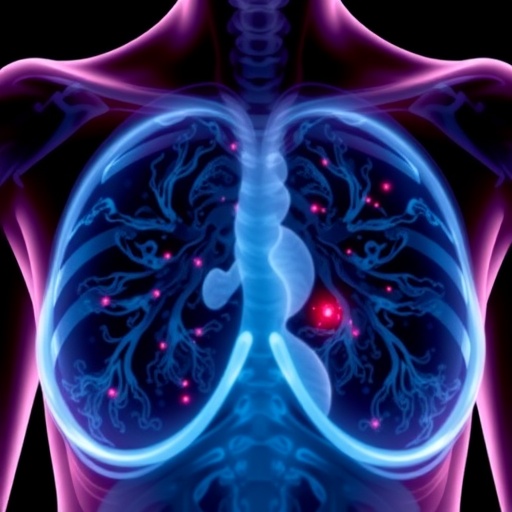In a groundbreaking advancement that may herald a new era for the treatment of metastatic breast cancer, researchers have unveiled the promising results of a phase II clinical trial investigating the combination of nivolumab and low-dose ipilimumab in patients with hypermutated HER2-negative metastatic breast cancer. This pivotal study, conducted under the NIMBUS trial protocol, probes an innovative immunotherapeutic strategy aimed at overcoming the formidable challenge of tumor resistance in an aggressive cancer subset. The findings add a crucial layer to existing oncological knowledge and ignite hope for patients previously confronted with limited treatment options.
Metastatic breast cancer remains a leading cause of cancer mortality worldwide, complicated by heterogeneity in tumor biology and genetic profiles. The HER2-negative subtype, in particular, lacks the benefit of targeted HER2 therapies and often exhibits limited response to conventional treatments. Against this backdrop, the advent of immune checkpoint inhibitors such as nivolumab, an anti-PD-1 antibody, together with ipilimumab, an anti-CTLA-4 antibody, offers a tantalizing therapeutic angle predicated on modulating the patient’s own immune system to recognize and eradicate tumorous cells.
The NIMBUS trial specifically recruited patients with hypermutated tumors—those harboring a high tumor mutational burden (TMB)—under the hypothesis that such cancers present more neoantigens capable of eliciting robust immune responses. By selecting this subset, the investigators aimed to maximize the likelihood of clinical benefit from checkpoint inhibition, acknowledging that hypermutation often correlates with responsiveness to immunotherapy across several malignancies.
Mechanistically, nivolumab disrupts the PD-1/PD-L1 axis, restoring the cytotoxic activity of exhausted T-cells within the tumor microenvironment. Conversely, ipilimumab targets CTLA-4, a checkpoint molecule that downregulates immune activation early in the immune response cascade. The synergy of these agents at carefully optimized dosages intends to potentiate antitumor immunity while mitigating adverse effects, which traditionally have limited the broader application of combination immunotherapy.
The trial’s methodology incorporated rigorous inclusion criteria, biomarker assessments, and comprehensive safety monitoring, underscoring a meticulous approach to establishing both efficacy and tolerability in a real-world clinical population. Patients were administered nivolumab alongside low-dose ipilimumab, a regimen designed to sustain immune activation with reduced toxicity compared to high-dose administrations prevalent in earlier studies.
Clinically, initial data from the NIMBUS trial reveal encouraging response rates, including durable partial and complete remissions in a proportion of participants. These findings signal a meaningful increment in therapeutic options, particularly for patients who have exhausted standard chemotherapeutic avenues or exhibit resistance to existing treatments. Tumor shrinkage was accompanied by improved symptomatology and quality of life metrics, hallmark indicators of the regimen’s clinical value.
From a molecular perspective, correlative studies within the trial illuminated critical biomarkers predictive of response, including PD-L1 expression levels and specific mutational signatures. The integration of these biomarkers into patient stratification algorithms promises to refine candidate selection, enhancing personalized medicine approaches and mitigating unnecessary exposure to immunotherapy in non-responders.
Adverse events observed adhered to the known profiles of checkpoint inhibitors but were largely manageable with standard supportive care and algorithm-driven dose adjustments. Importantly, the low-dose ipilimumab strategy appeared to attenuate immune-related toxicities, a crucial consideration for the delicate balance between efficacy and safety in immuno-oncology.
Moreover, the NIMBUS trial exemplifies a broader trend in oncology: leveraging genomic profiling to identify hypermutated tumors across diverse histologies. This patient-centric approach aligns with precision medicine’s goals, transforming how oncologists tailor interventions based on the genetic landscape rather than solely anatomical origin.
The implications of these findings extend beyond immediate clinical impact and into the realms of translational research. Understanding the mechanisms underpinning response heterogeneity, resistance pathways, and immune evasion strategies in hypermutated breast tumors will inform future drug development pipelines and potentially uncover novel targets for combination therapies.
As immunotherapeutics continue to evolve, the NIMBUS trial serves as a testament to the critical importance of thoughtful dose optimization and patient selection in enhancing outcomes while preserving quality of life. This approach fosters sustainable treatment paradigms capable of integrating into routine oncology practice without compromising safety.
In addition, the trial highlights the importance of multidisciplinary collaboration among oncologists, immunologists, molecular biologists, and bioinformaticians, whose combined expertise enabled the seamless conduct of this complex clinical investigation. Such teamwork is indispensable in unraveling the intricacies of tumor-immune interactions and advancing state-of-the-art cancer care.
Looking forward, the scientific community anticipates larger, randomized phase III trials to validate and expand upon the promising NIMBUS findings. Concurrently, real-world data and post-marketing surveillance will be essential to ascertain long-term benefits, resistance mechanisms, and potential late-onset toxicities associated with this therapeutic combination.
Ultimately, the NIMBUS trial stands out as a beacon of innovation, harnessing immunotherapy to surmount the challenges presented by hypermutated HER2-negative metastatic breast cancer. It underscores the transformative potential of precision oncology and sets the stage for improved survival and quality of life among patients confronting this formidable disease.
Subject of Research: Immunotherapy combination of nivolumab and low-dose ipilimumab in hypermutated HER2-negative metastatic breast cancer
Article Title: Nivolumab plus low-dose ipilimumab in hypermutated HER2-negative metastatic breast cancer: a phase II trial (NIMBUS)
Article References:
Barroso-Sousa, R., Zanudo, J.G.T., Li, T. et al. Nivolumab plus low-dose ipilimumab in hypermutated HER2-negative metastatic breast cancer: a phase II trial (NIMBUS). Nat Commun 16, 4430 (2025). https://doi.org/10.1038/s41467-025-59695-1
Image Credits: AI Generated
Tags: cancer mortality reduction strategieshigh tumor mutational burden in cancerhypermutated HER2-negative metastatic breast cancerimmune checkpoint inhibitors in oncologyimmunotherapy advancements in breast cancerinnovative trials in metastatic breast cancerneoantigen-based cancer therapiesNIMBUS trial findingsnivolumab and low-dose ipilimumab combination therapyovercoming tumor resistance strategiespersonalized cancer treatment approachestargeted treatments for metastatic breast cancer





